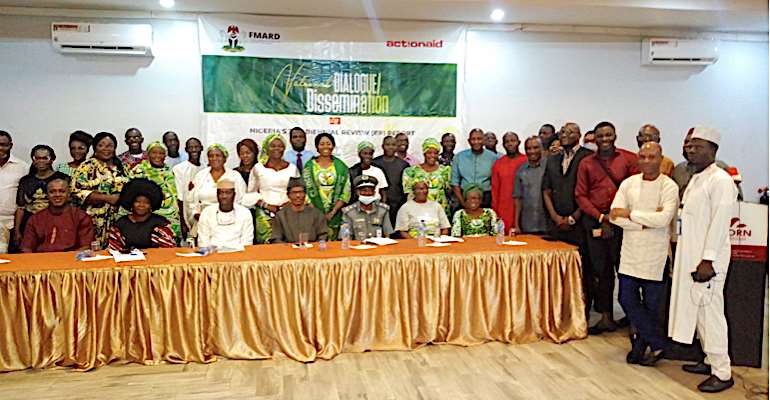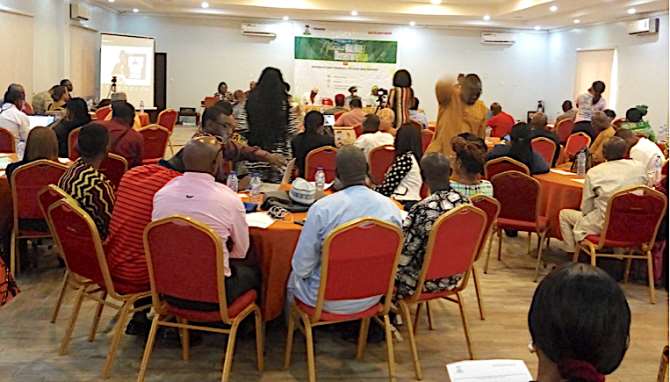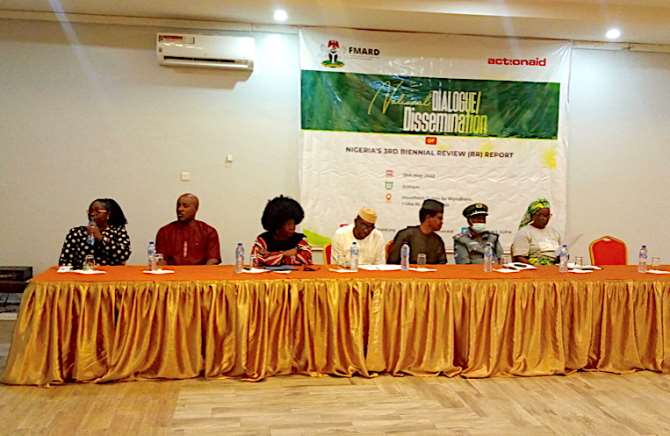Nigeria Disseminates AU-CAADP 3rdBR Report As Stakeholders Task FG On Strategic Agricultural Investment

Agriculture stakeholders in Nigeria have urged the government to scale up investment in strategic areas of the sector in order to achieve the objectives of the Comprehensive African Agricultural Development Programme of the African Union (CAADP) targeted at ending hunger in 2025.
The encouragement was part of the outcome of the ongoing two –day national dialogue and dissemination of Nigeria’s 3rd Biennial review (BR) report on CAADP held in Abuja, Nigeria’s federal capital territory.
The event which brought together state and non-state actors to deliberate on the 2021 CAADP report and seek the ways forward for the country, was organized by Actionaid – Nigeria, in collaboration with the Federal Ministry of Agriculture and Rural development.
The 3rd CAADP Biennial Report launched in March, 2022 by the African union Commission showed that Rwanda was the only African country that was on track in the 7 CAADP/ Malabo commitment areas: Recommitment to the principles and values of the CAADP process, ending hunger by 2025, enhancing investment financing in Nigeria, halving poverty through Agriculture by 2025, boosting intra-African trade in Agricultural commodities and services; enhancing resilience to climate variability and enhancing mutual accountability for actions and results.
According to the report, Nigeria was only able to keep on track in 2 out of the 7 commitments: Halving poverty through Agriculture by 2025 and boosting intra-African trade in Agricultural commodities and services in the region, where the country scored 5.96 and 6.52 points out of 5.81 and 5.00 minimum scores for BR cycle respectively.
In the overall report, Nigeria was reported to have scored a total of 5.42 over 10 points, which places it below the track in implementing the Malabo declaration on Agriculture transformation in Africa.
However, Nigeria has continued to improve in its data gathering process.
Disseminating Nigeria’s performance in a presentation during the meeting, the Assistant Director, CAADP focal point in the Federal Ministry of Agriculture, Ibrahim Mohammed, identified some of the inhibiting challenges of the country to include inadequate budgetary provision to the Agricultural sector to meet the AU/CAADP Malabo minimum of 10 percent of member countries’ total budget.
He also identified inability of the country to conduct Agriculture census and other related surveys; inadequate budgetary allocations and releases for statistical activities; inadequate ICT infrastructure and software for analysis; weak synergy between departments and agencies for data generation and storage, and non availability of time series data to effectively track progress, among others, as further contributors to Nigeria’s poor performance.
He maintained that increased political will by the federal government to address the identified issues above would help improve the country’s performance in the next BR report.
Addressing participants, the Country Director, Actionaid, Nigeria, Mrs Ene Obi, decried the general decay in infrastructural facilities in the country, especially roads, which he noted impedes agricultural produce mobility, leading to losses and heavy costs of movement.
She made a case for increased access of Small scale women farmers to government incentives, grants, inputs, equipment and other services as a way of enhancing agricultural performance in the country.
Obi explained: “The data/information we collected through the Value Addition Biennial Review Toolkit (VABKIT), that reflected the lived realities of smallholder women farmers across the 36 states and the Federal Capital Territory (FCT) shows that nationwide, smallholder women farmers currently have only 18% access to processing facilities, 16.60% access to storage facilities, 13.50% access to off-takers/access to markets, 9.60% access to transportation for agricultural produce, and 42.30% access to trainings.
“On Extension Services, smallholder women farmers have access to only 5.26% farm demonstrations and 19.47% farmers’ field schools…”
The country director further insisted that only investment in strategic agricultural areas could bail the country from hunger and reposition it in the right track.
She said: “For Nigeria to be on track in meeting the 2014 Malabo Declaration Commitments going forward, we hope that the three tiers of government would commit 10% of their annual budget to the agriculture sector required to support at least 6% growth rate for the sector as postulated in the CAADP framework.
”And investments should focus on strategic areas of Extension Services, Access to Credit, Women in Agriculture, Youth in Agriculture, Appropriate Labour-Saving Technologies, Inputs, Post-Harvest Losses Reduction Supports (processing facilities, storage facilities, trainings, market access, etc.), Climate Resilient Sustainable Agriculture (CRSA)/Agroecology; Research and Development; Monitoring and Evaluation, as well as Coordination.”
Declaring the event open, the Permanent secretary, Federal Ministry of Agriculture and rural Development, Dr. Ernest Umakhihe, stated that the commitment of Buhari’s administration in Agriculture is justified by the sector’s steady contribution of 25 percent to the country’s GDP.
He urged stakeholders at the event to be open in forging the agenda for improved agricultural development in the country.
Umakhihe added: “Indeed, the meeting is meant to enable stakeholders identify data gaps and possible sources for the next BR process, as well as pinpoint the areas for the preparation of policy briefs for the articulation of projects and programmes towards enhancing the process of attaining CAADP commitment by 2025.”
Others who spoke at the event, including the representative of Actionaid-International, Mrs Constance Okeke; the ECOWAS commission representative, Dr.Manson Nwafor, and the Actionaid Food and Agricultural Programme Coordinator, Azubike Nwokoye, harped on the importance of the report, as a wakeup call for African governments in general, and Nigeria in particular, to work hard to put agriculture in its rightful place.
Further discussions by participants centred on the way forward for the country with some suggesting that Nigeria should consult with Rwanda to draw lessons from her strategies. Goodwill messages were received from the representatives of Food and Agricultural Organisation, Small scale women farmers’ organization, Nigeria Custom Service, National Bureau of Statistics, Civil Society Organisations, among others.


